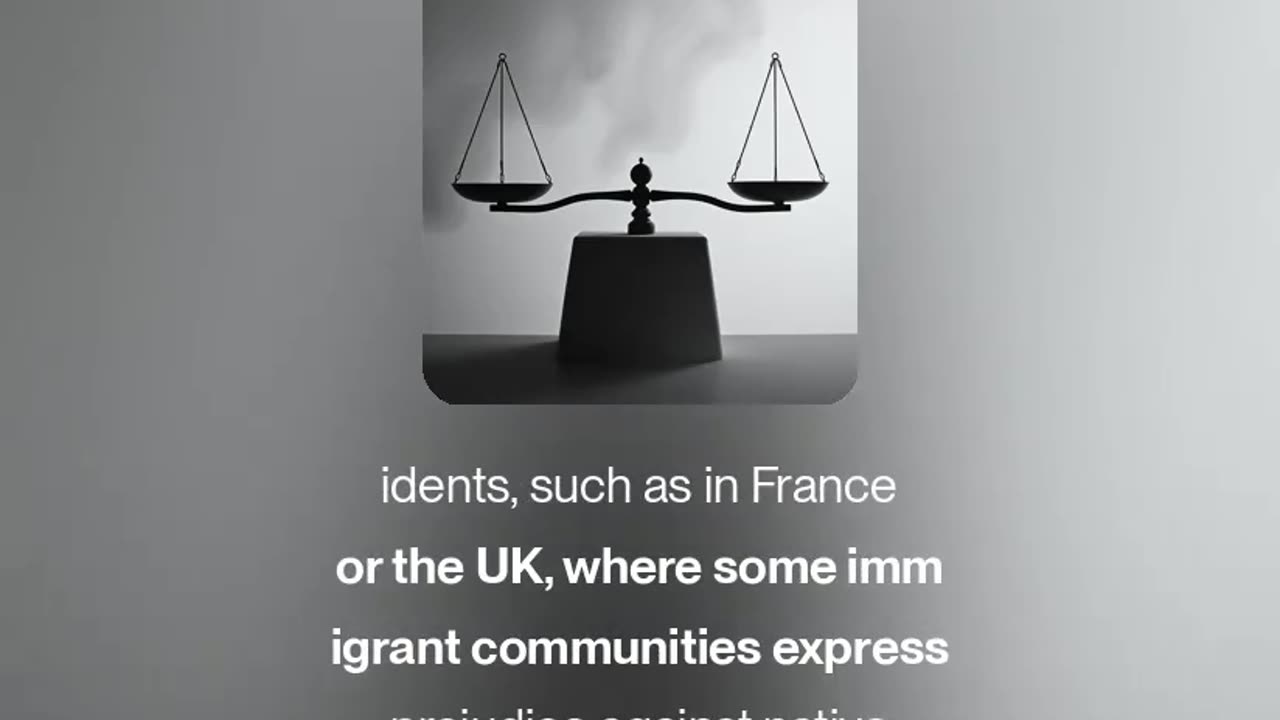Premium Only Content

Blacks Can't Be Racists?
The notion that racism can only be perpetrated by white individuals effectively exempts black people and other non-white groups from any moral accountability for prejudiced attitudes or actions rooted in race. This exaggerated premise not only unfairly brands whites as perpetual aggressors but also enforces a bifurcated ethical framework, where one demographic is perpetually scrutinized while others are granted leniency for similar behaviors. Such immature perspectives extend far beyond the borders of the United States, manifesting recurrently in regions where descendants of European settlers intersect with those of African heritage, often exacerbating tensions through policies, rhetoric, and social dynamics that invert traditional power structures without acknowledging universal human flaws.To unpack this further, consider the underlying philosophy: by redefining racism as "prejudice plus power," proponents create a shield for non-white prejudice, implying that without systemic dominance, discriminatory views or acts aren't truly harmful or culpable.
This redefinition, popularized in academic and activist circles over decades, doesn't eliminate bias; it merely relabels it, allowing for open hostility toward whites under the guise of justice or retaliation.
Critiques highlight how this approach is logically flawed and socially divisive—it presumes that moral responsibility hinges on group status rather than individual agency, effectively infantilizing non-whites by suggesting they lack the capacity for ethical wrongdoing in racial matters.
In essence, it erodes the principle that all humans, regardless of background, should be held to the same standards of decency, fostering resentment and perpetuating cycles of division rather than promoting genuine equality.This double standard stigmatizes whites as inherent "victimizers," portraying them as the sole bearers of racial guilt in a way that echoes historical scapegoating but in reverse.
It ignores the reality that prejudice is a human universal, not confined to any one group, and that excusing it based on perceived power imbalances only breeds more intolerance.
For instance, in philosophical terms, true moral philosophy demands that ethical evaluations apply equally; to do otherwise undermines the very concept of justice, reducing it to a tool for tribal advantage rather than a universal ideal.These views are indeed not confined to America. In South Africa, where the African majority holds political power post-apartheid, anti-white rhetoric and actions—such as chants of "Kill the Boer" by political parties like the EFF, or debates over land expropriation targeting white farmers—demonstrate how racial animosity can flow from those in authority toward a minority group. Claims of "farm murders" being racially motivated highlight a pattern where whites are vilified as colonial remnants, absolving perpetrators of full moral scrutiny under narratives of historical redress.
Similarly, in Europe, amid migration from African diasporas, instances of anti-white bias emerge in public discourse and incidents, such as in France or the UK, where some immigrant communities express prejudice against native Europeans, often framed as resistance to "whiteness" rather than racism.
In Australia, surveys and reports reveal everyday racism directed at white Australians by non-white groups, including verbal abuse or exclusion, yet these are frequently downplayed or excused due to the same "power dynamics" logic, despite whites not always holding unchallenged dominance in diverse urban settings Globally, this juvenile mindset—rooted in oversimplified binaries of oppressor and oppressed—fails to account for the complexity of human societies, where power shifts, and prejudice persists across all lines. It absolves no one of responsibility; instead, it entrenches division, suggesting that ethical standards are relative to race rather than absolute. True progress requires recognizing that racism, in its core form as racial prejudice, is a flaw anyone can exhibit, and holding all accountable is the only path to mutual respect.
-
 LIVE
LIVE
vivafrei
2 hours agoTrans Violence Canadian Media is IGNORING! Activist Judge vs. Trump AGAIN! Ostrche Update & MORE!
6,318 watching -

Awaken With JP
2 hours agoTrans Shooter is the Victim, Vaccines in Trouble, and Greta is Ugly - LIES Ep 106
11.1K4 -
 LIVE
LIVE
Pop Culture Crisis
1 hour agoJK Rowling Calls Out HARRY POTTER Director, Sydney Sweeney Dating Scooter Braun? | Ep. 909
394 watching -
 LIVE
LIVE
Futures Edge: Finance Unfiltered with Jim Iuorio and Bob Iaccino
49 minutes agoLIVE Technical Analysis with Mike Arnold
567 watching -
 3:47:18
3:47:18
Right Side Broadcasting Network
7 hours agoLIVE REPLAY: President Trump Makes an Announcement - 9/2/25
159K55 -

The Quartering
2 hours agoAlex Jones Goes To WAR With Owen Shroyer, Are All Women Terrible?, Woke Backfire Of The Year!
70.3K16 -

The White House
6 hours agoPresident Trump Makes an Announcement, Sep. 2, 2025
8.86K10 -
 2:15:05
2:15:05
MattMorseTV
2 hours ago $9.90 earned🔴Trump's Oval Office BOMBSHELL.🔴
15.3K10 -
 18:14
18:14
Real Estate
14 hours ago $0.38 earnedRising Prices PUSHING AMERICANS OVER THE EDGE
6.39K1 -
 1:43:35
1:43:35
Russell Brand
3 hours agoTrump Demands Big Pharma PROVE Covid Vaccine Is Safe – Did Pfizer LIE?! - SF626
131K25